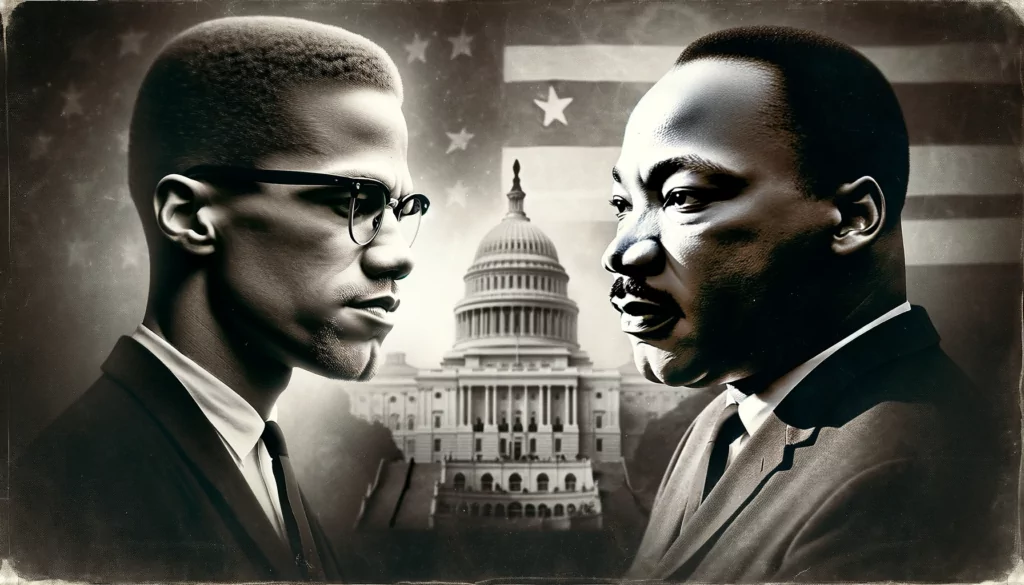The following sample is meant to be a source of inspiration for students in their academic pursuits.

✅ AI Essay Writer ✅ AI Detector ✅ Plagchecker ✅ Paraphraser
✅ Summarizer ✅ Citation Generator
The American civil rights movement, a pivotal era in the nation’s history, was marked by the emergence of two prominent leaders: Malcolm X and Martin Luther King Jr. Their visions and methods for achieving racial equality and freedom were distinctly different, offering diverse perspectives within the struggle for civil rights. This essay explores the differences between Malcolm X and Martin Luther King in their approaches to achieving racial justice for African Americans.
Historical Background
The mid-20th century in the United States was characterized by a profound struggle for civil rights, particularly for African Americans who faced rampant segregation and discrimination. This period was marked by significant social and political upheaval as African Americans actively sought to assert their rights and claim their rightful place in society. Amidst this backdrop, two influential figures emerged as leading voices in this struggle: Malcolm X and Martin Luther King Jr. Both leaders, while united in their ultimate goal of achieving equality and freedom for African Americans, adopted markedly different philosophies and tactics in their pursuits. Malcolm X, known for his fiery and uncompromising rhetoric, advocated for a more radical approach to securing these rights. In contrast, Martin Luther King Jr. championed a path of nonviolent resistance, drawing on principles of peaceful protest. These divergent approaches highlighted the complexity and multifaceted nature of the fight for civil rights during this pivotal era in American history.
Martin Luther King Jr. and Non-Violence
Martin Luther King Jr., often abbreviated as MLK, was a proponent of non-violent protest. Influenced by the teachings of Mahatma Gandhi, King believed in peaceful methods to achieve civil rights. He led marches and peaceful protests, advocating for integration and equality in a non-aggressive manner. King’s philosophy was one of love and forgiveness, aiming to unite rather than divide the nation. His leadership during events like the Montgomery Bus Boycott and the March on Washington was instrumental in bringing national attention to the injustices faced by African Americans.
Malcolm X and Separatism
In contrast, Malcolm X, a member of the Nation of Islam, initially advocated for separatism rather than integration. He believed that African Americans should establish their own institutions and communities, separate from those of white Americans. Malcolm X’s approach was more radical, often perceived as militant. He famously stated that freedom should be achieved “by any means necessary,” which was interpreted as an endorsement of violence, if required, for self-defense. Malcolm X’s stance softened after leaving the Nation of Islam, where he began to advocate for racial unity but still maintained a more militant approach than King.

Ideology Differences and Community Impact
The core difference between Malcolm X and Martin Luther King lies in their ideologies. King’s approach was rooted in non-violence and peaceful protest, aiming to achieve racial integration and harmony. On the other hand, Malcolm X initially supported racial separatism and was open to using more aggressive means to defend and uplift African Americans. Their differing views on how to achieve freedom and equality reflected the diversity of thought within the civil rights movement.
Both Malcolm X and Martin Luther King Jr. had significant impacts on the civil rights movement. King’s non-violent approach garnered widespread support, leading to significant legislative changes like the Civil Rights Act of 1964 and the Voting Rights Act of 1965. Malcolm X’s advocacy for black self-sufficiency and his later openness to racial harmony inspired many African Americans to fight more assertively for their rights. Their combined efforts contributed to the gradual dismantling of segregation and the advancement of civil rights in America.
Conclusion
In conclusion, while Malcolm X and Martin Luther King Jr. both aimed to achieve racial equality and freedom for African Americans, their methods and philosophies were notably different. King’s legacy of non-violent, peaceful protest and Malcolm X’s initial separatist stance, followed by a call for racial unity, represent the diverse strategies within the civil rights movement. Understanding the differences between Malcolm X and Martin Luther King is crucial in appreciating the multifaceted nature of the struggle for civil rights in the United States. Their distinct approaches played a significant role in shaping the nation’s journey towards racial equality.
Follow us on Reddit for more insights and updates.



Comments (0)
Welcome to A*Help comments!
We’re all about debate and discussion at A*Help.
We value the diverse opinions of users, so you may find points of view that you don’t agree with. And that’s cool. However, there are certain things we’re not OK with: attempts to manipulate our data in any way, for example, or the posting of discriminative, offensive, hateful, or disparaging material.